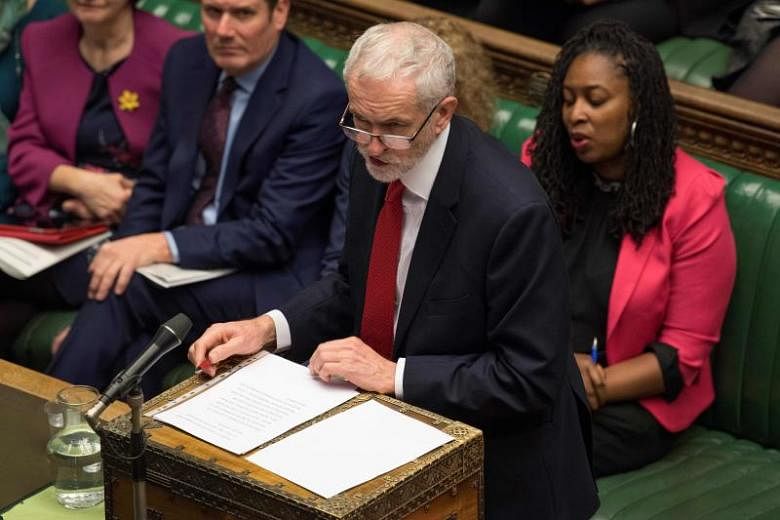LONDON (REUTERS) - Britain's opposition Labour Party will back a new referendum on Brexit after Parliament defeated its alternative plan for leaving the European Union, its eurosceptic leader Jeremy Corbyn said, softening his reservations about a second popular vote.
With 29 days left until Britain is due to leave the EU, the leaders of Britain's two main parties have been forced into making key turns on the divorce in recent days.
After months of saying that Britain must leave the EU on time on March 29, Prime Minister Theresa May opened up the possibility on Tuesday (Feb 26) of a short limited extension to the exit date.
Mr Corbyn, who voted against membership in 1975 and gave only reluctant backing to the 2016 campaign to stay, on Wednesday gave ambiguous backing for another referendum, saying he would push for one alongside a national election.
It is the first time since Britons voted in 2016 to leave the EU that one of its two major political parties has thrown its weight behind giving voters a chance to change their minds. It was unclear what the exact question might be.
"After tonight's votes in Parliament, we'll continue to push for a close economic relationship based on our credible alternative plan or a general election," Mr Corbyn said. "We'll also back a public vote in order to prevent a damaging Tory Brexit or disastrous no-deal."
Mr John McDonnell, the second most powerful man in the Labour Party, said it would put down an amendment calling for a second referendum as soon as Mrs May brought a deal back to Parliament.
Britain's Brexit minister, Mr Steve Barclay, said there was no consensus in Parliament for another referendum or even on what question might be asked.
After Mrs May's deal was rejected on Jan 15 in the biggest parliamentary defeat in modern British history, she is hoping to bring back a tweaked divorce accord for a vote, which could come as early as next week but may not take place until March 12.
If her deal is voted down, Mrs May has promised that lawmakers will get a chance to vote the day after on whether to leave with no deal, and then on March 14 on asking the EU to delay the deadline.
French President Emmanuel Macron said on Wednesday that the EU would agree to extend the Brexit deadline beyond March 29 only if Britain justified such a request with a clear objective.
Lawmakers on Wednesday voted 502-20 in support of an amendment proposed by opposition Labour lawmaker Yvette Cooper that spelled out Mrs May's proposed timetable.
The government backed the amendment though 20 lawmakers in Mrs May's party voted against and 80 abstained.
After enduring more than 2½ years of uncertainty since the 2016 referendum, some business chiefs are relieved the threat of a no-deal exit has been pushed back to late June though others said the delay merely prolonged the lack of clarity.
"I would categorise it as a further annoyance," Aston Martin chief executive Andy Palmer told Reuters. "You're holding that contingency stock for longer which means that your working capital is tied up for longer."
Aston Martin, which has authorised up to £30 million (S$54 million) worth of contingencies, is stocking more components and could fly in parts if ports are clogged up.
Investment bank Goldman Sachs said it expected many Brexit-supporting Conservative lawmakers to accept a revised deal, partly because the Labour Party was tilting towards a second referendum.
"We continue to see the most likely outcome of the current impasse as eventual ratification of the Prime Minister's Brexit deal, with a three-month extension of Article 50," it said.
Goldman Sachs raised the probability of that outcome to 55 per cent from 50 per cent while cutting its view of no-deal Brexit to 10 per cent from 15 per cent. It kept the probability of no Brexit at 35 per cent.
Mrs May has a serious chance of getting a deal approved by Parliament in the next few weeks, Conservative Party lawmaker Oliver Letwin said.
"She might just squeak it," Mr Letwin told Sky.
"For the first time, although I think it is less than 50 per cent, I think there is a serious chance that in the course of the next few weeks that the Prime Minister will get her deal through," Mr Letwin said.











